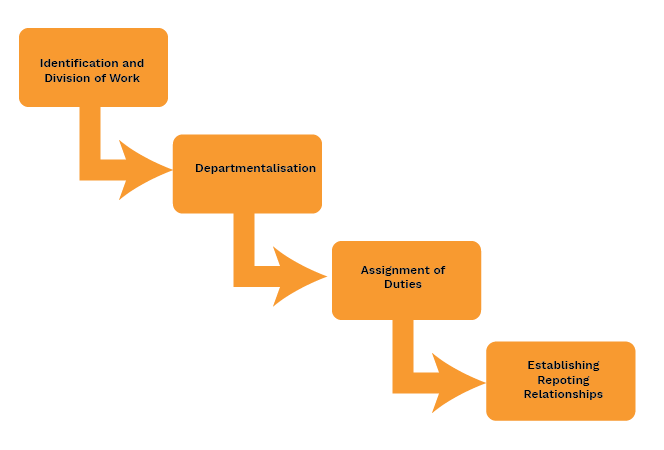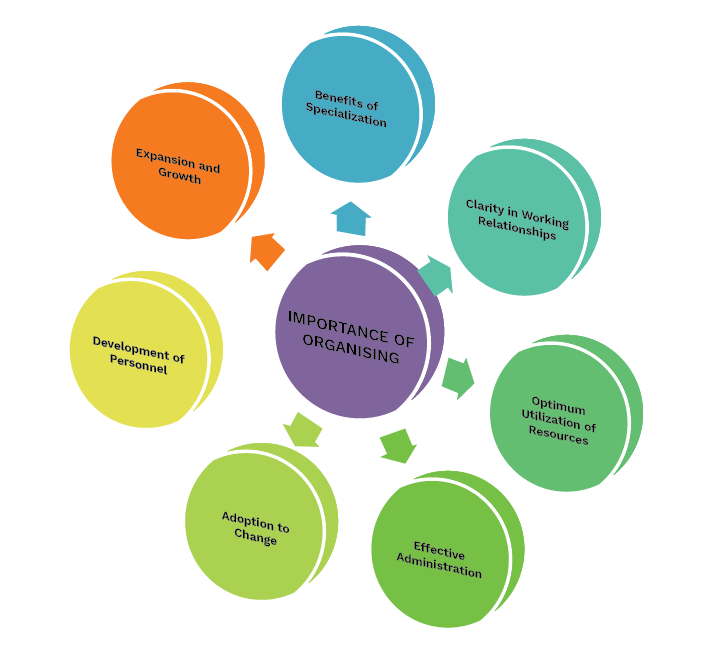Business Studies Notes for Chapter 5 Organising Class 12 - FREE PDF Download


FAQs on Organising Class 12 Business Studies Chapter 5 CBSE Notes - 2025-26
1. What are the key principles of organising discussed in the Class 12 Business Studies Chapter 5 Revision Notes?
The main principles of organising include identification and division of work, departmentalisation, assignment of duties, and establishing reporting relationships. These ensure tasks are distributed efficiently, responsibilities are clear, and coordination is achieved across all levels.
2. How does understanding organisational structure help students revise Chapter 5 more effectively?
Organisational structure provides a framework showing how tasks are grouped and authority flows within a business. Grasping this helps students remember the role of functional and divisional structures, making it easier to visualise how businesses operate and facilitating faster recall during revision.
3. What are the main differences between functional and divisional structures as outlined in the revision notes?
The functional structure groups employees based on specialisation (like marketing, HR), improving efficiency but possibly creating rigidity. The divisional structure groups activities by product line or region, offering flexibility and accountability but possibly causing duplication of resources. Both have distinct advantages and limitations for business growth and coordination.
4. Which features of formal and informal organisation should students focus on during last-minute revision?
For rapid revision, focus on these distinctions:
- Formal organisation: defined roles, rules, unity of command, stability, but potential for procedural delays.
- Informal organisation: formed by social interactions, allows quick communication and fulfils social needs, but can disrupt formal objectives.
5. Why is the process of delegation considered crucial in the organising function, according to the revision notes?
Delegation is crucial because it assigns responsibility, authorises subordinates, and ensures accountability. This helps managers focus on core tasks, develops employee skills, motivates teams, and establishes clear management hierarchy, all of which are essential for effective organisation and smooth business operations.
6. How do centralisation and decentralisation differ and why is their balance important for businesses?
Centralisation keeps most decision-making at the top level, leading to greater control but less flexibility. Decentralisation shares authority across levels, encouraging quick decisions and managerial growth. A balance is important as it enables stability, efficient operation, and adaptability to organisational needs.
7. What strategies are recommended in the notes for quick and effective chapter revision before exams?
Effective strategies include using concept maps to connect key terms, making diagrams of organisational structures, focusing on comparisons (like functional vs. divisional structures), and relating concepts to real business cases. Summarising each subtopic and practising short answers also aids fast recall.
8. How does the span of management affect organisational structure as explained in the revision notes?
The span of management refers to the number of subordinates a manager can effectively supervise. A wider span leads to a flatter structure, promoting faster communication, while a narrower span creates more levels, improving control but possibly delaying decisions.
9. In what ways does effective organisation contribute to the overall growth and expansion of a business?
Effective organisation enables optimal resource use, adaptability to changes, better delegation, development of personnel, and streamlined administration. These aspects help a business quickly respond to market needs and scale operations without confusion or duplication of work.
10. What common misconceptions about organising might lead to errors in exam answers, and how can students avoid them?
Misconceptions include thinking that organising is only about structuring roles or that delegation means loss of authority. To avoid errors, students should emphasise that organising integrates roles, relationships, and resources, and that delegation spreads responsibility while retaining accountability for outcomes.



























